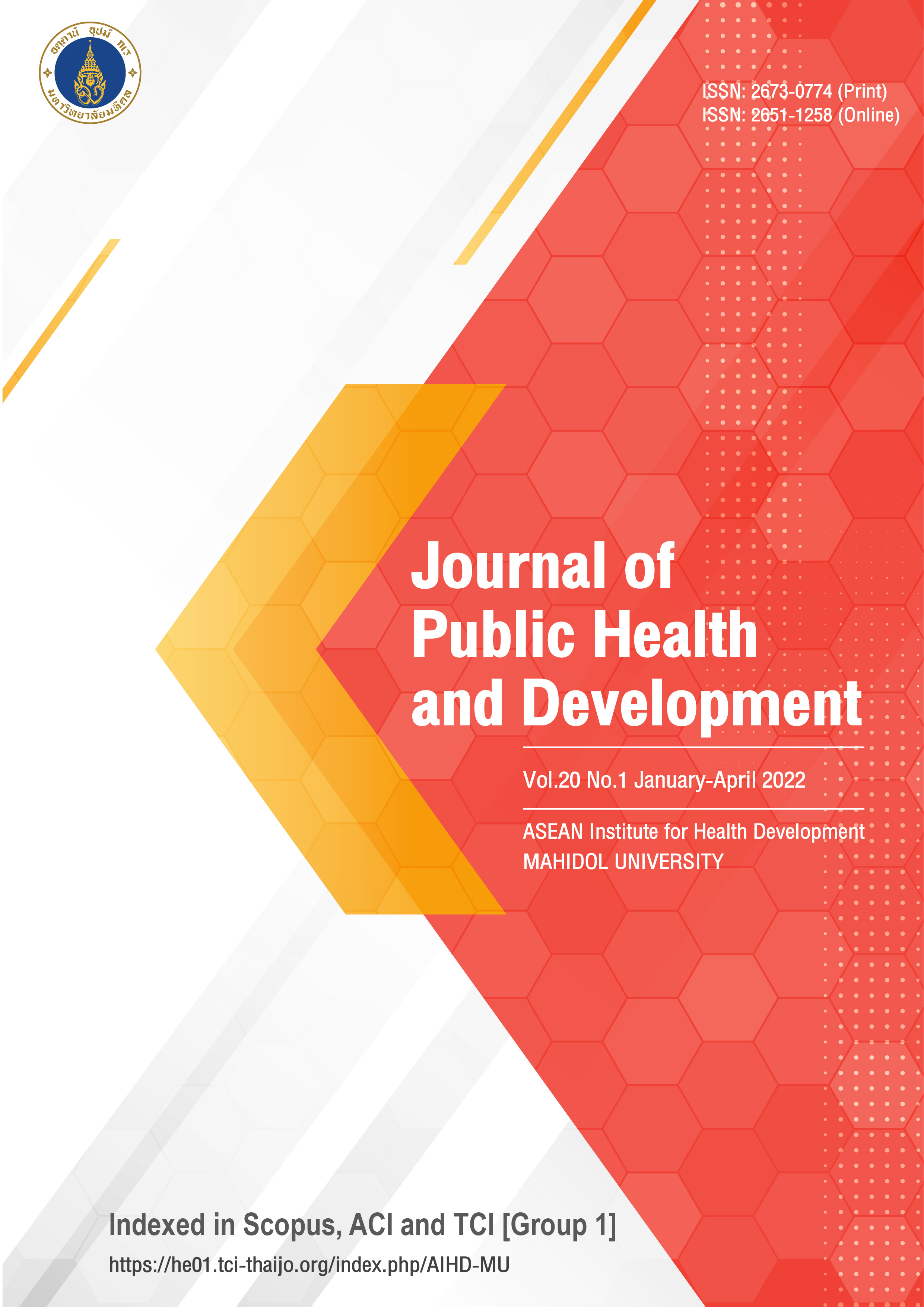Effects of a 4D program on blood sugar control among patients with type 2 diabetes in Pathumthani Province 10.55131/jphd/2022/200101
Main Article Content
Abstract
Diabetes is considered the most common non-communicable disease, coupled with high blood pressure and lipids. Thus, decreasing carbohydrate, sugar, fat and sodium (4Ds) are target behaviors for patients with diabetes to reduce the chance of long-term complications. This two-group, quasi-experimental research was designed mainly to assess the effects of a 4Ds program on dietary behaviors and blood sugar control of patients with type 2 diabetes in Pathumthani Province. Seventy patients were recruited from the sub-district health promotion hospital (HPH) of Muang District. The experimental group attended the program activities based on Bandura’s social learning theory for 12 weeks. Pre- and post-test data were collected using a structured interview questionnaire. T-test was applied to test the program effectiveness.
Findings affirmed the effectiveness of the 4Ds program. Because the experimental group gained more knowledge and had higher self-efficacy to manage blood sugar control behaviors, better perceived outcome expectations in modifying the behaviors and significantly less carbohydrate, sugar, fat and sodium consumption than the comparison group was observed (p<0.001). Their average fasting blood sugar (FBS) decreased to the desired controllable level. The average FBS of the comparison group slightly decreased. The FBS of the experimental group was significantly decreased than the comparison group (p<0.001). In designing an intervention, health officers may use self-efficacy as a starting point of the program features and the knowledge required should be relevant to the designed behavioral targets
Article Details

This work is licensed under a Creative Commons Attribution-NonCommercial-NoDerivatives 4.0 International License.
References
Bureau of Non-Communicable Diseases, Department of Disease Control, Ministry of Public Health. World diabetes statistics. 2017.
Wichai Ekpalakorn. Report of the 5th Thai health survey by physical examination. Nonthaburi: Graphic & Design Publishing; 2014.
Wichai Ekpalakorn. Diabetic situation in Thailand. Diabetes Journal. 2017;49(1):7-14.
Medical and Health Data System, Ministry of Public Health. Data for service plan of non-communicable disease (NCD, DM, HT, CVD). 2017
Ruchada Crasecy. Diabetes: Basic knowledge and related laboratory examinations. 2nd Ed. Chiang Mai University Press; 2015.
Suthera Boontam; Manirat Therawiwat, Nirat Imamee. Factors related to self-care behaviors of Type II diabetic patients in Suphan Buri Province. Health Educ J. 2013; 36(123): 65-80.
Supacha Sootchai, Manirat Therawiwat, Nirat Imamee, Supreya Tunsakul. Health Educ J. 2017 39(133):35-50.
Green LW, Kreuter, MW. Health promotion planning: An educational and ecological approach 3rd Ed. CA: Mayfield; 1999:113-16.
Green LW, Kreuter MW, Deeds SG, Partridge KB. Heath education planning: a diagnostic approach. Palo Alto, CA: Mayfield; 1980.
Clark NM, Gong M, Kaciroti N. A model of self-regulation for control of chronic disease. Health Educ Behav. 2001:28 (6): 769-82.
Pender NJ, Murdaugh CL, Parsons MA. Health promotion in nursing practice. 5th Ed. NJ: Pearson Education; 2006:57-9.
Bandura, A. Self-efficacy in changing societies. NY:Cambridge University Press. 1997.
Diabetes Association of Thailand under the Patronage of HHR Princess Maha Chakri Sirindhorn. Clinical Practice Guideline for Diabetes 3rd Ed. Patumtani: Media Romyen; 2017. p. 5,35,39,55-8.
Pathanan Srimuang. Food for health and nutritional therapy. Bangkok: M & M Laser Print; 2012. p. 200 – 11.
Lemeshow S, Hosmer WD Jr, Klar J, Lwanga SK. Adequacy of sample size in health studied. New York: Wiley & Sons; 1990. P. 38-40.
Veena Tiangtham, Jantima Niampoka, Apaporn Powatana, Sutam Nantamongkol. Health promotion program for Type II diabetic patients who could not control blood sugar. J Public Health. 2009; 41(2): 149-161.
Bandura, A. Self-efficacy: toward a unifying theory of behavioral change. Psychological Review, 1977; 84, 191-215.
Bandura, A. Perceived self-efficacy in cognitive development and functioning. Educational Psychologist, 1993; (28):117-148.
McAlister AL, Perry CL, Parcel GS. How individuals, environments, and health behaviors interact. In Glanz K, Rimer BK, ViswanathK, (Eds.). Health behavior and health education 4th Ed. San Francisco, CA. Jossey-Bass; 2008. p. 170-77.
Green LW, Kreuter, MW. Health program planning: an educational and ecological approach 4th Ed. NY: McGraw-Hill; 2005. p. 147-170.
Clark NM, Starr NS. Management of Asthma by Patients and Families. AmJRespirCritCare Med; 1994: 149:S54-S66.
Clark NM, Zimmerman BJ: A social cognitive view of self-regulated learning about health. Health Educ Res: Theory and Practice; 1997, 1990:(5): 371-379.
Orawan Mungvongsa, Manirat Therawiwat, Supreya Tunsakul, Nirat Imamee. Self-efficacy program for dietary to control blood sugar of type II diabetic patients in Nakornpratom province. Journal of Department of Medicine. 2017; 42(5): 62-70.
Umalee Tornsri, Pucharanee Pawatagul, Manirat Therawiwat, Kandawasi Maleewong. Nutritional promotion program: Decreasing of sweet, fat, sodium applying self-efficacy and family social support of type II diabetic patients. J Public Health. 2018; 48(3): 284-295.
Vichai Tiantong. Health behavioral surveillance system for changing risk behaviors of diabetic and hypertensive among normal, risk, and sick groups in Thailand. Bangkok: Agricultural Cooperative of Thailand; 2013. p. 20.






